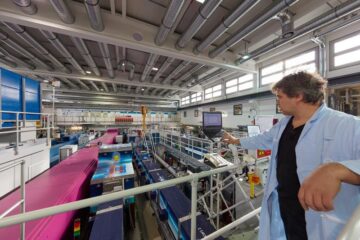CK2 Inhibitors – New CK2 Kinase Inhibitors for antineoplastic drugs and diagnostics

Beside cardiovascular diseases, malignant tumours take
the second place in cause of human death. Neoplastic diseases are indicated by a high cell proliferation. The inhibition of this cell proliferation by an active agent in a medicament is a worldwide accepted approach for tumour therapy. Protein kinase CK2 belongs together with others to the group of second-messenger independent kinases. Despite of unambiguous references for the involvement of CK2 in malignant transformation, tumour origin and progression, there are only a few effective inhibitors for this enzyme on-hand. FMS-like tyrosine kinase 3 (FLT3) is a receptor tyrosine kinase expressed by immature hematopoietic cells and is important for the normal development of stem cells and the immune system. In 30%-35% of patients with acute myeloid leukemia (AML) a mutation of FLT3 is observed. This invention provides access to a novel class of potent human CK2 and FLT3 kinase inhibitors. The disclosed compounds can be used as active ingredients e.g. for the treatment of neoplastic diseases. Further, the patent application discloses synthesis of the compounds with optimised product yield.
Weitere Informationen: PDF
PROvendis GmbH
Tel.: +49 (0)208/94105 10
Ansprechpartner
Dipl.-Ing. Alfred Schillert
Media Contact
Alle Nachrichten aus der Kategorie: Technologieangebote
Neueste Beiträge

Bakterien für klimaneutrale Chemikalien der Zukunft
Forschende an der ETH Zürich haben Bakterien im Labor so herangezüchtet, dass sie Methanol effizient verwerten können. Jetzt lässt sich der Stoffwechsel dieser Bakterien anzapfen, um wertvolle Produkte herzustellen, die…

Batterien: Heute die Materialien von morgen modellieren
Welche Faktoren bestimmen, wie schnell sich eine Batterie laden lässt? Dieser und weiteren Fragen gehen Forschende am Karlsruher Institut für Technologie (KIT) mit computergestützten Simulationen nach. Mikrostrukturmodelle tragen dazu bei,…

Porosität von Sedimentgestein mit Neutronen untersucht
Forschung am FRM II zu geologischen Lagerstätten. Dauerhafte unterirdische Lagerung von CO2 Poren so klein wie Bakterien Porenmessung mit Neutronen auf den Nanometer genau Ob Sedimentgesteine fossile Kohlenwasserstoffe speichern können…

















